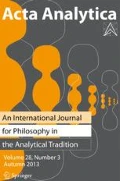Abstract
According to the conceptualist view in the philosophy of perception, we possess concepts for all the objects, properties, and relations which feature in our experiences. Richard Heck has recently argued that the phenomenon of illusory experience provides us with conclusive reasons to reject this view. In this paper, I examine Heck’s argument, I explain why I think that Bill Brewer’s conceptualist response to it is ineffective, and I then outline an alternative conceptualist response which I myself endorse. My argument turns on the fact that both Heck, in constructing his objection to conceptualism, and Brewer, in responding to it, miss a crucial distinction between perceptual demonstrative concepts of objects, on the one hand, and perceptual demonstrative concepts of properties, on the other.
Similar content being viewed by others
Notes
From now on, I will talk simply of ‘demonstrative concepts’ instead of ‘perceptual demonstrative concepts’: I will not be concerned with demonstrative concepts of any other sorts.
See Heck 2000, pp. 494–5.
I.e. — a Fregean ‘Thought’.
Heck 2000, p.495.
In a case where no table is perceived, we might want to say that the expression ‘that shade’ does not refer to any shade.
Ibid., p.496.
I should note here that I am conceiving of colour shades as universal-like entities that exist independently of their instances.
See Evans 1982, chapters 4 & 6.
Ibid, p. 107.
Evans himself would, I think, hold that there is another (not necessarily competing) explanation of my inability to acquire a demonstrative concept of ‘that can’ on the basis of my hallucinatory experience. Cf. note 16 below.
Evans 1982, p. 106.
We would also have to establish that the metaphysics presupposed by the appeal to fundamental grounds of difference is unproblematic. Cf. Peacocke 1992, pp. 234–5.
Many thanks to Emma Borg, Bill Brewer, Jonathan Dancy, Phil Goff, Hemdat Lerman, Anders Nes, Ram Neta, and Galen Strawson.
References
Brewer, B. (1999). Perception and reason. Oxford: Oxford University Press.
Brewer, B. (2005). Perceptual experience has conceptual content. In Steup and Sosa.
Campbell, J. (2002). Reference and consciousness. Oxford: Oxford University Press.
Evans, G. (1982). The varieties of reference. Oxford: Oxford University Press.
Heck, R. (2000). Non-conceptual content and the “space of reasons”. Philosophical Review, 109, 483–523.
McDowell, J. (1990). Peacocke and Evans on demonstrative content. Mind, 99, 255–266.
McDowell, J. (1994). Mind and world. Cambridge, MA: Harvard University Press.
Peacocke, C. (1991). Demonstrative content: A reply to John McDowell. Mind, 100, 123–133.
Peacocke, C. (1992). A study of concepts. Cambridge, MA: MIT Press.
Steup, M., & Sosa, E. (2005). Contemporary debates in epistemology. Oxford: Blackwell.
Author information
Authors and Affiliations
Corresponding author
Rights and permissions
About this article
Cite this article
Pelling, C. Conceptualism and the Problem of Illusory Experience. Acta Anal 22, 169–182 (2007). https://doi.org/10.1007/s12136-007-0001-1
Received:
Revised:
Accepted:
Published:
Issue Date:
DOI: https://doi.org/10.1007/s12136-007-0001-1


